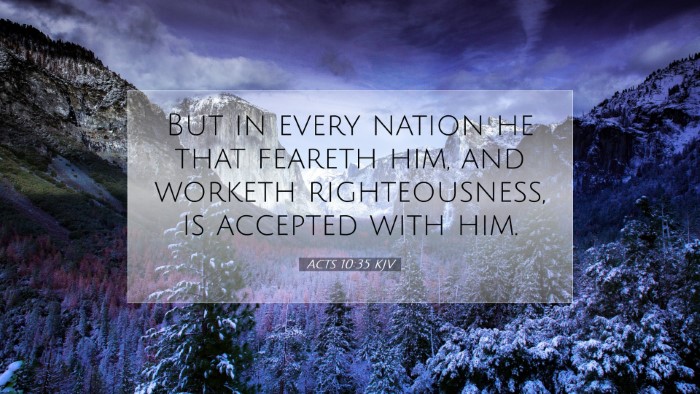Bible Commentary on Acts 10:35
Acts 10:35 (KJV): "But in every nation he that feareth him, and worketh righteousness, is accepted with him."
Introduction
Acts 10:35 is a pivotal verse in the New Testament that underlines the universality of God's grace and acceptance. This verse is situated in the context of Peter's vision and his subsequent visit to Cornelius, a Gentile centurion, which marked a significant turn in the early Church's understanding of the gospel's reach. The insights from various public domain commentaries deepen our understanding of this critical text, emphasizing themes of divine acceptance, righteousness, and the implications for God's covenant.
Exegesis of Acts 10:35
According to Matthew Henry's Commentary, this passage illustrates the principle that God's acceptance is not confined to one particular nation or ethnicity. He states that those who "fear God" and "work righteousness" are recognized by Him regardless of their background. This emphasizes God's impartiality, an important theme in the early Church as they navigated the inclusion of Gentiles into the faith.
Albert Barnes further elaborates that the term "nation" signifies all races and cultures. He reflects on the significance of being part of a particular faith community based on moral behavior and reverence for God rather than tribal or national identity. Barnes articulates that the phrase "feareth him" implies a true reverence and acknowledgment of God's authority and holiness, which is crucial for any relationship with the divine.
Adam Clarke highlights the crucial role of "working righteousness," suggesting that genuine faith is evidenced through acts of righteousness. Clarke emphasizes that true faith is not mere belief; it manifests in a life aligned with God's moral law. He correlates this with the teachings of Christ, wherein the authenticity of one's faith is demonstrated by the fruits of their actions.
Theological Implications
The verse presents several theological implications that are essential for pastors and theologians. Firstly, it advocates for a broad understanding of God's nature as seeker of worshippers from all nations. The inclusion of Gentiles into the community of believers serves as a reminder that the gospel transcends cultural and ethnic boundaries.
-
Divine Acceptance: The verse reassures believers that God's acceptance is not based on race or prior religious affiliation but on their fear of Him and commitment to righteousness.
-
The Role of Righteousness: It challenges the notion of a mere intellectual acknowledgment of God, pushing believers toward an active, ethical response to their faith.
-
Interconnectedness of Nations: The integration of Gentiles into the faith is a precursor to the Church's mission of reaching all nations, reinforcing the global nature of Christianity.
Application for Today
For pastors and church leaders, Acts 10:35 serves as a call to foster inclusivity within the faith community. Recognizing the fear of God and the practice of righteousness as the true markers of faith helps in creating a welcoming environment for all.
Additionally, it invites congregations to reflect on the ways in which they define righteousness. The challenge lies in moving beyond cultural righteousness to a more holistic view that aligns with the principles found in Scripture.
For students of theology, this verse is a profound reminder that the early Church grappled with issues of ethnicity and inclusion, providing a historical lens through which modern-day issues can be examined. The themes of acceptance and righteousness warrant discussion around social justice, mission work, and ecumenical engagement.
In practice, the emphasis on "feareth him" encourages believers to cultivate a deep reverence for God that can be a transformative force in their lives and communities.
Conclusion
Acts 10:35 encapsulates the essence of God’s inclusive nature in the Christian faith. By drawing insights from the commentary of Matthew Henry, Albert Barnes, and Adam Clarke, we see a rich tapestry woven into the understanding of acceptance, righteousness, and the call to a global mission. This verse not only challenges the early Church's perceptions of inclusion but also commands modern believers to uphold and reflect these values authentically in their communities.


